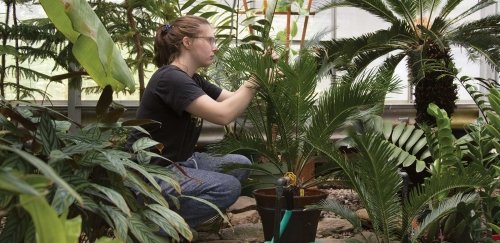Green Campus Initiatives
During days of extreme heat or cold, RIC works with CPower to divert energy from our school to places that need it more – like Roger Williams Hospital. A lot of energy is used during intense weather, which can stress the power grid and lead to outages. To avoid outages in critical spaces like hospitals, the “Demand Response” program allows us to reduce and redirect our energy and be rewarded for it.
Since 2011, RIC graduates have crossed the stage in GreenWeaver® regalia, made entirely of
recycled plastic bottles. In this time, over 313,370 bottles have avoided the landfill by being
upcycled into caps and gowns for our graduates.
- All of the current chemicals utilized by the college are green certified, as they are high performing cleaning agents while also being environmentally responsible.
- RIC uses green certified microfiber wet/dry mops
- The college incorporates 99% HEPA filters for vacuums and shampoo machines
- 95% green chemical soap scrubbing as opposed to less "friendly" stripping
- RIC uses Green certified soap and paper towels throughout campus
- Green certified trash bags that have been tested to break down 50% faster at the landfill.
- No harsh chemicals are ever used anywhere on the campus by the RIC custodial department (no bleach, ammonia, etc).
Rhode Island College is en route to becoming 100% LED lit! Thanks to funding from the Rhode Island Office of Energy Resources and Rhode Island Energy, LED lighting will be added to areas of the Murray Center, the Pennfield bathrooms, exterior Pennfield lighting, and three rooms in Fogarty and Clarke. Once that is complete, RIC will be lit entirely by LEDs. LED light bulbs can last around 10 years longer than normal bulbs, reducing the waste and maintenance cost that
comes from replacing normal bulbs.
Furthermore, many buildings on campus use energy efficient lighting, using occupancy sensors to automatically shut off the lights when rooms are empty. This saves energy from going to waste when classroom lights are accidentally left on.
RIC has an electronic building management system in place that is used to control the heating, ventilation, and air conditioning in all major buildings on campus. This system allows for energy savings by programming the systems in coordination with classroom and event schedules. The system is managed from a desktop computer and in many buildings temperatures can be controlled down to an individual room level. Room and building temperatures have different set points depending on whether they are occupied and unoccupied.
A 110kW Solar Array was added to the roofs of Donovan Dining Center and the Student Union to create a source of energy that is both green and cost effective. Solar panels will also be added to the roof of Clarke Science during its renovation.
The Donovan Solar Array generates the most energy during daylight savings time between March and November, with about 8 tons of carbon emissions being avoided and 18 MWh of energy being generated every month. Since the panels were added in March 2019, over 556 tons of carbon emissions were avoided and over 548 MWh of energy was created!
- The steam plant produces steam that is used to heat the buildings during the heating season and cool the buildings during the air conditioning season (using steam absorbers).
- The college has made several modifications to the facility that have resulted in significant energy savings. The replacement of several key valves and a reduction in steam pressure has allowed the college to run on one boiler rather than two to achieve these savings.
- The steam plant operates well within its emission cap.
Most campus computers have power management software installed that will automatically manage the power the computer uses to reduce energy usage. With approximately 1,700 computers on campus, this will translate into considerable energy reduction and cost savings.
During the remodeling of Horace Mann, old classroom and office furniture was saved and given to schools in Central Falls and Providence. Instead of ending up in the landfill, this valuable equipment went on to live another life in classrooms that would benefit from the donation.
RIC is home to over 50 water bottle filling stations, which allow students to reuse the same bottle multiple times, as opposed to purchasing and discarding countless single-use plastic bottles. These stations have saved over 1 million water bottles so far and that number continues to grow! To further decrease the amount of single-use water bottles being used on campus, reusable water bottles will be passed out at orientation.
The Donovan Dining Center partners with Newport Biodiesel to convert the cooking oil from RIC into clean burning Biodiesel to heat homes and power vehicles throughout Rhode Island. Biodiesel is a renewable, non-toxic, locally produced fuel that can be used in any diesel engine or oil furnace.



